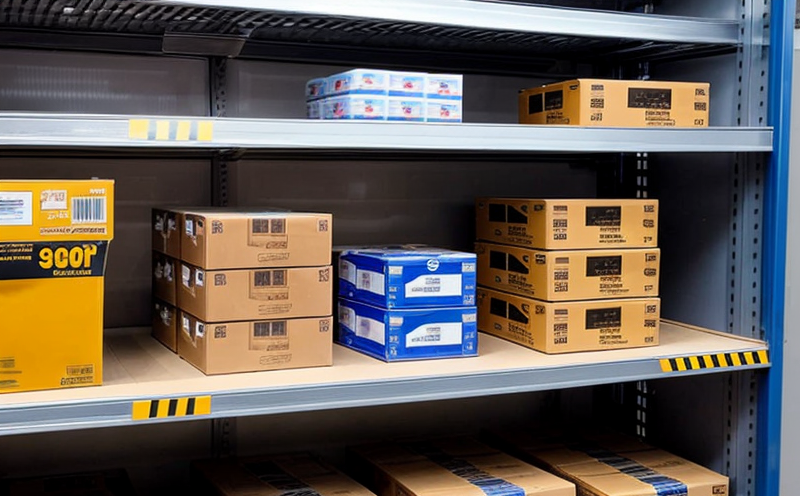ASTM D1709 Dart Impact Resistance of Films
The ASTM D1709 test method is a critical tool for evaluating the integrity and durability of films used in packaging. This procedure assesses how resistant a film is to impact from a weighted dart, simulating real-world conditions where packages may be subject to mechanical stress during handling or transport.
This testing methodology ensures that packaged medical devices meet safety standards and can withstand the rigors of distribution without compromising integrity. The test involves placing a film sample between two plates with a specified mass in grams attached to one plate, which is then dropped onto the film from a controlled height. The objective is to measure how much force or impact resistance the film provides before it fails.
The procedure is particularly relevant for films used in packaging medical devices that require high levels of integrity to ensure product safety and efficacy. This test helps manufacturers verify that their materials meet the necessary standards set forth by regulatory bodies, including ISO 11607 and EN 862-4.
For a quality manager or compliance officer, understanding this test is essential for ensuring that packaging meets the required standards. R&D engineers can use the results to optimize film formulations and design more robust packaging systems. Procurement professionals need to know about this test when selecting suppliers who provide films that meet these stringent requirements.
The ASTM D1709 test ensures that the packaging used in medical device production is reliable, safe, and effective throughout its lifecycle, from manufacturing to final delivery. This reliability translates into enhanced patient safety and improved overall product quality.
Why It Matters
The importance of ASTM D1709 cannot be overstated in the context of medical device packaging integrity. Ensuring that films used in packaging can withstand physical impacts is crucial for maintaining the safety and efficacy of medical devices during transit and storage.
A failed film can lead to compromised product integrity, potentially exposing patients to harmful contaminants or rendering a device non-functional. This failure can result from various factors, including improper handling, rough transport conditions, or even internal mechanical stresses within the packaging itself.
The ASTM D1709 test provides a standardized method for evaluating these risks, offering consistent and reliable results that help manufacturers make informed decisions about their packaging materials. By adhering to this standard, companies can ensure that their products meet regulatory requirements and provide safe, effective packaging solutions.
For quality managers and compliance officers, the ASTM D1709 test is a key component of ensuring product integrity throughout the supply chain. It helps in identifying potential weaknesses in the packaging design and material selection early on, allowing for corrective actions to be implemented before products reach market distribution.
In summary, the ASTM D1709 Dart Impact Resistance of Films test is essential for maintaining high standards in medical device packaging. By ensuring that films can withstand physical impacts, this test supports the overall safety and efficacy of medical devices, ultimately benefiting patients and healthcare providers alike.
Applied Standards
| Standard | Description |
|---|---|
| ASTM D1709-23a | This standard specifies the procedure for determining the resistance of plastic films to impact from a weighted dart. It is applicable to flexible packaging materials used in various industries, including medical device packaging. |
| ISO 11607:2019 | This international standard provides requirements and test methods for barrier properties of packages intended to contain sterile medical devices. ASTM D1709 aligns with this standard in evaluating the impact resistance of films used in such packaging. |
| EN 862-4:2015 | This European standard outlines the requirements for barrier properties and test methods applicable to packages containing sterile medical devices. ASTM D1709 supports these requirements by assessing film integrity under impact conditions. |
| Parameter | Value |
|---|---|
| Dart mass (g) | 350 ± 10 |
| Height of drop (cm) | 20 ± 0.5 |
| Test temperature (°C) | (23 ± 2) °C |
| Humidity (% RH) | (50 ± 5) % RH |
Environmental and Sustainability Contributions
The ASTM D1709 Dart Impact Resistance of Films test plays a crucial role in environmental sustainability by ensuring that medical device packaging not only meets safety standards but also contributes to reducing waste. By evaluating the durability and integrity of films used in packaging, this test helps manufacturers design more robust packages that can withstand harsh conditions without compromising product quality.
Robust packaging reduces the likelihood of breaches during transport or storage, which minimizes the need for re-packaging or replacement. This, in turn, leads to lower material usage and waste generation, promoting a more sustainable approach to medical device manufacturing.
The test also encourages the use of eco-friendly materials that can withstand impact without sacrificing safety. By selecting sustainable packaging solutions that pass the ASTM D1709 test, manufacturers contribute to reducing the environmental footprint associated with medical device distribution.
Additionally, by ensuring that packages meet all necessary standards and requirements, this test supports a circular economy model where products are designed for reuse or recycling at their end of life. This approach helps in minimizing landfill waste and promoting resource efficiency throughout the product lifecycle.





